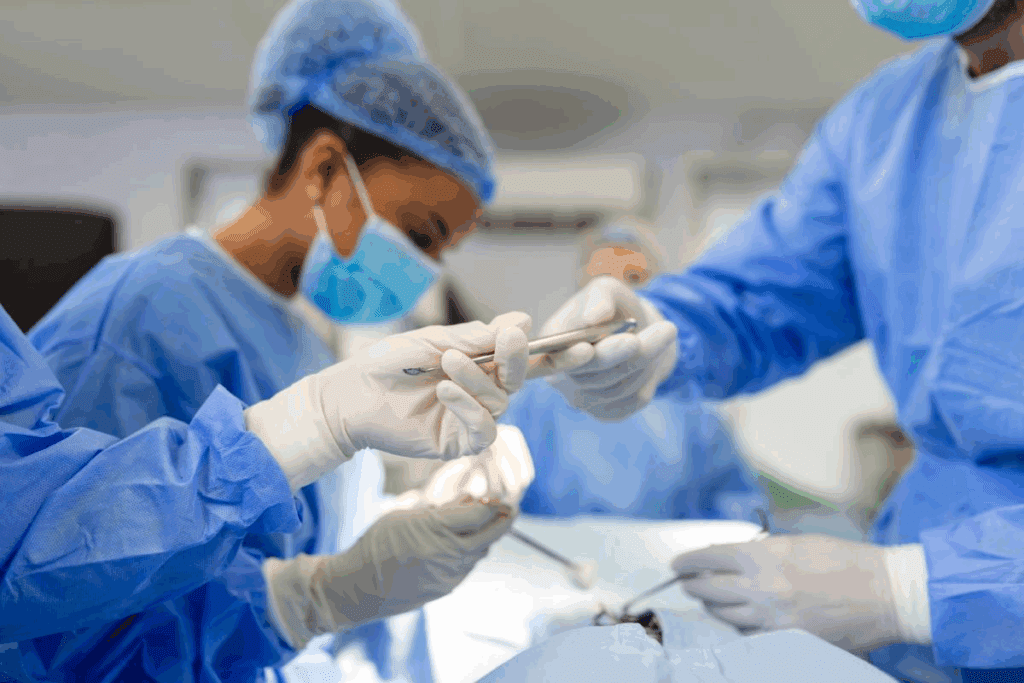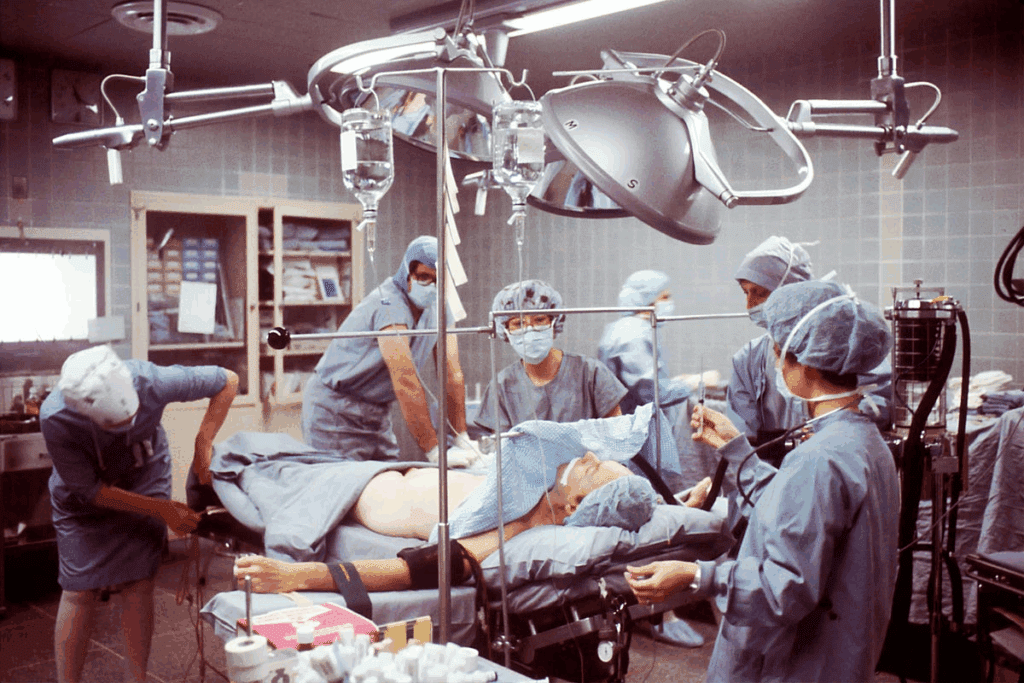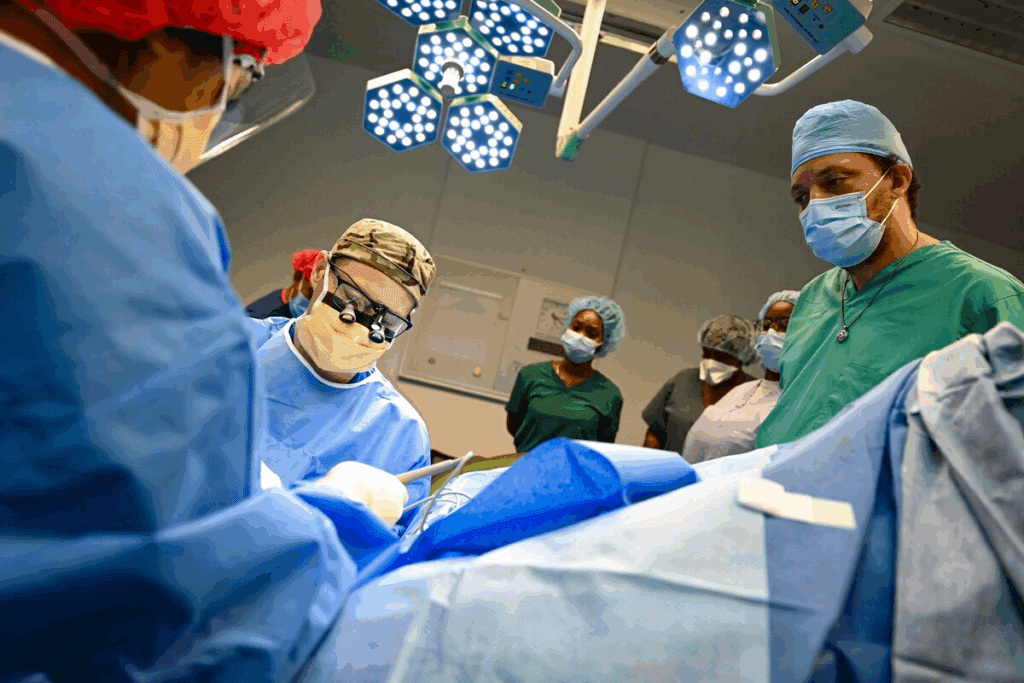Last Updated on November 27, 2025 by Bilal Hasdemir

Surgeons often face tough choices and complex procedures. But some surgeries are much harder than others. Neurosurgery, for example, requires working in the most sensitive parts of the body. It needs a level of skill and precision that’s rare in other surgeries.
Every surgical procedure needs a lot of expertise. But some surgeries, like those in the brain or major blood vessels, are even more challenging. The hardest surgery specialty often deals with these high-risk areas. It demands a surgeon to be extremely careful and precise.
It’s key for surgeons to grasp the details of surgical complexity. This helps them make better choices.
Surgical complexity is about how complicated a surgery is. It depends on the patient’s health, the surgeon’s skills, and the surgery type.
Several important factors make a surgery hard. These include:
Surgical difficulty also depends on precision needed, risk of complications, and the chance of blood loss or other challenges during surgery.
Risk assessment is vital in planning surgeries, mainly for complex procedures. Surgeons must weigh the risks and benefits. They consider the patient’s health, medical history, and any factors that could affect the surgery’s success.
Good risk assessment means looking closely at the patient’s condition, thinking about other treatment options, and talking with the patient about risks and expected results.
By carefully looking at these factors, surgeons can get ready for complex surgeries. This helps improve patient results.

Some surgical specialties are much harder than others. This is because of the complex procedures involved. The complexity comes from the delicate organs, the need for precision, and the risks to the patient.
To figure out how hard a surgery is, we look at a few things. These include:
Neurosurgery is often seen as one of the toughest due to the brain and spinal cord’s complexity. Cardiac Surgery and Transplant Surgery are also very complex because of the critical organs involved and the high risks of the procedures.
Looking closely at different surgical specialties shows big differences in difficulty. For example:
| Surgical Specialty | Complexity Level | Skill Level Required |
| Neurosurgery | High | Advanced |
| Cardiac Surgery | High | Advanced |
| Transplant Surgery | High | Expert |
| General Surgery | Moderate | Intermediate |
It’s important for both surgeons and patients to understand these complexities. Surgeons need a lot of training to master the necessary surgical skill levels. Patients should know the risks and challenges of complex surgeries.

Neurosurgery is all about precision and understanding the brain’s complex nature. It’s a field where surgeons work on the body’s most delicate parts. They need a lot of skill and the latest technology to do their job.
Brain surgery is very complex because of the brain’s detailed structure. Neurosurgeons have to carefully move through the brain to fix problems. They must be very precise to avoid harming other important parts.
They use state-of-the-art technology like MRI and CT scans to plan and do surgeries. This helps them to be more accurate and successful.
Some neurosurgical procedures are even more challenging. These include:
These surgeries need a lot of technical skill and knowledge. Surgeons must also be able to handle complex cases.
| Procedure | Complexity Level | Precision Requirement |
| Tumor Removal | High | Very High |
| AVM Repair | Very High | High |
| Aneurysm Treatment | High | Very High |
Cardiac surgery is a very complex and demanding field in medicine. It includes many procedures, like coronary artery bypass grafting and heart transplants. Each one needs a lot of skill and precision.
Cardiac surgeons face big challenges because of the heart’s anatomy. They must manage serious conditions that can be deadly if not treated right. Even small mistakes can cause big problems.
Open-heart surgery is very tough because it requires direct access to the heart. This means opening the chest, called sternotomy, and sometimes stopping the heart. A heart-lung machine is used to keep the heart and lungs working during surgery.
Managing risks from the heart-lung machine and avoiding tissue damage are big challenges. Surgeons also have to keep the patient stable during the surgery. They must be ready for any unexpected problems that might come up.
Repairing an aortic dissection is a very complex procedure. It fixes a tear in the aorta, the main artery that carries blood from the heart. This is a life-threatening condition that needs immediate surgery.
Other risky procedures include fixing complex congenital heart defects and redoing heart surgeries. These need a lot of technical skill and understanding of the patient’s specific situation and history.
In summary, cardiac surgery is full of challenges, from the complexities of open-heart surgery to the dangers of procedures like aortic dissection repair. The skills, precision, and decision-making needed are among the highest in medicine.
Transplant surgery is a highly specialized field. It involves complex operations like organ transplantation and multi-organ transplants. These procedures need a lot of skill and precision from the surgical team.
Organ transplantation means replacing a sick or damaged organ with a healthy one from a donor. This process is complex. It requires precise matching between the donor and recipient, along with detailed surgical techniques.
The complexity of organ transplantation also comes from the need for immunosuppressive therapy. This is to prevent rejection, but it can have significant side effects on the recipient.
Multi-organ transplants are among the most challenging procedures in transplant surgery. These operations involve replacing two or more organs in one surgery. This makes the procedure much more complex and risky.
Examples of multi-organ transplants include liver-kidney, heart-lung, and pancreas-kidney transplants. Each of these procedures requires careful planning and execution.
| Type of Transplant | Complexity Level | Survival Rate |
| Single Organ Transplant | High | 85-90% |
| Multi-Organ Transplant | Very High | 70-80% |
The table above shows the complexity and survival rates for single and multi-organ transplants. While both are complex, multi-organ transplants are more challenging. This is because they involve more organs and have a higher risk of complications.
Pediatric surgery is very complex. It needs surgeons with special skills, precision, and care. They work on babies to teenagers, fixing many different problems.
Congenital defects are a big part of pediatric surgery. These are problems babies are born with. They can be simple or very complex, needing many surgeries.
Congenital heart defects are a big challenge. They need detailed surgeries to work right.
The CDC says about 1 in 33 babies in the U.S. are born with birth defects. This shows how important skilled pediatric surgeons are.
“The surgical correction of congenital defects in children requires not only technical skill but also a deep understanding of the child’s physiology and the possible long-term effects of the surgery.”
| Condition | Surgical Complexity | Age of Patient |
| Congenital Heart Defect | High | Neonate to Adolescent |
| Cleft Palate | Moderate | Infant |
| Neural Tube Defect | High | Neonate |
Children are small and delicate, making surgery tricky. Surgeons need to know a lot about kids’ bodies. Kids also react differently to surgery and medicine than adults do.
Dealing with kids emotionally and psychologically is also key. Surgeons must talk well with kids and their families. They need to be reassuring and supportive.
In summary, pediatric surgery is very complex. It involves fixing many problems in kids. The challenges of working with young patients require great skill and care.
Microsurgery is one of the toughest surgical fields because it needs extreme precision. Surgeons must do very delicate work. They need a lot of technical skill and to be good at microvascular techniques.
Replantation surgery shows how complex microsurgery is. Surgeons try to reattach severed limbs or digits. They need to be very precise and understand the tiny structures involved.
Replantation surgery is a great example of the precision needed in microsurgery. Surgeons must connect tiny blood vessels and nerves. This is a very challenging task that requires advanced microsurgical instruments and a lot of skill.
The success of these surgeries depends on the surgeon’s skill in microvascular techniques. They must make sure the reattached limb or digit gets enough blood and nerve function.
New technologies have changed microsurgery for the better. They help make procedures more precise and successful. Robotic assistance and high-definition imaging have made operations more accurate.
These new tools have not only made surgeries better but also opened up new possibilities in this challenging field.
Oncologic surgery is very complex. It’s about removing tumors without harming vital functions. Surgeons face many challenges, like understanding tumor biology and patient anatomy.
Removing tumors is key in oncologic surgery. It needs precision and a deep understanding of the tumor. Surgeons must also avoid damaging nearby tissues to keep function and reduce risks.
Key Challenges in Tumor Removal:
Surgeons must find a balance in oncologic surgery. They need to remove cancer aggressively but also protect the patient’s quality of life. This balance is key to effective treatment and minimizing long-term harm.
| Surgical Approach | Goals | Challenges |
| Radical Surgery | Complete tumor removal | Risk of damage to vital structures |
| Conservative Surgery | Preserve organ function | Risk of incomplete tumor removal |
Understanding oncologic surgery and tumor removal challenges helps surgeons. They can improve patient outcomes by mastering these complex procedures.
Spinal surgery is very complex and requires a lot of skill. The spine is key for our body’s structure and protects the spinal cord. So, surgeries here are very tricky.
Spinal surgery includes many types of operations. These range from fixing scoliosis to rebuilding the spine. Surgeons need to know a lot about the spine and be very skilled.
Fixing scoliosis is one of the toughest surgeries. It’s about straightening the spine, which takes a lot of time and precision. Rebuilding the spine after injuries or wear and tear is also very hard.
“The main goal of scoliosis surgery is to make the patient’s life better,” says a top spinal surgeon. “It’s a detailed process that needs careful planning and doing.”
Minimally invasive spine surgery is a big step forward. It helps patients recover faster and causes less damage. But, it also brings its own set of problems.
Doctors have to work through tiny cuts, using new imaging to guide them. This needs a lot of skill and the ability to adjust to each situation.
Being good at surgery is key in spinal surgery. As technology and methods improve, spinal surgeons will get even better. This will lead to better results for patients.
Surgeons in trauma surgery have a tough job. They manage many injuries and make quick decisions that affect patients’ lives. They need technical skill, fast thinking, and calmness under pressure.
Handling many traumas at once is key in trauma surgery. Surgeons must spot the most urgent injuries and treat them first. They need to understand how all injuries affect the patient.
Effective multiple trauma management means a quick assessment, stabilizing vital signs, and teamwork with other doctors. Advanced tools and imaging are also vital.
Making split-second decisions is vital in trauma surgery. Surgeons must act fast with little information. Their choices can mean life or death.
The pressure is huge. Surgeons need solid surgical skills, a clear mind, and teamwork skills. Training and experience are key to making these decisions.
Simulation training helps surgeons prepare for trauma surgery’s high-pressure. It lets them practice for different scenarios.
Surgeons face intense pressure, making their job’s psychological demands key. They need huge mental strength to do complex surgeries. The risks are always high.
Surgeons need technical skill, knowledge, and mental toughness. Operations like neurosurgeries or cardiac surgeries require precision and focus. They must stay calm and make quick, accurate decisions.
The high-pressure world of surgery can cause burnout. This affects a surgeon’s health and work. To last long in surgery, one must balance work and personal life.
Technology is changing complex surgery in big ways. Looking ahead, new surgical tools and techniques will keep improving. This will help patients and open up new possibilities in the operating room.
Robotic systems and AI are changing surgery. Robotic surgery offers more precision and control than old methods. It lets surgeons do complex tasks with better accuracy.
Key benefits of robotic surgery include:
AI helps robotic surgery by analyzing data in real-time. This mix of human skill and AI is raising the bar in surgery.
| Technology | Benefits | Impact on Complex Surgery |
| Robotic Surgery | Precision, flexibility, control | Enhanced accuracy in complex procedures |
| AI Assistance | Real-time data analysis, decision support | Improved decision-making during surgery |
Virtual reality (VR) is key in surgical training. It creates a realistic space for surgeons to practice. VR lets them master complex surgeries safely.
The advantages of VR training include:
The future of complex surgery is bright. With robotic surgery, AI, and VR, surgeons will face challenges with confidence. This will lead to better care for patients.
Complex surgery needs a lot of skill, precision, and training. Surgeons must be ready to face the challenges of these procedures. They also have to make important decisions quickly.
Each surgical specialty, like neurosurgery and cardiac surgery, has its own unique challenges. These require special training and knowledge.
Surgeons also need to keep up with new technologies and techniques. This is because surgical methods are always changing. By improving their skills, surgeons can help patients more and achieve great things in complex surgeries.
The future of complex surgery looks bright with new technologies and techniques on the horizon. Surgeons who learn and master these advancements will shape the future. Complex surgery will keep being a key part of healthcare, needing the best skills and knowledge.
A surgery is complex if it’s very detailed and requires a lot of precision. The patient’s health also plays a big role. Plus, the risks involved are higher. Such surgeries need special skills and a lot of accuracy.
Neurosurgery is seen as the most challenging. It deals with the brain and nervous system. Neurosurgeons need great hand-eye coordination and must make quick, precise decisions.
Complex surgeries can lead to infections, bleeding, and anesthesia problems. The chance of something going wrong is higher. So, surgeons must carefully check patients and plan to avoid risks.
Surgeons study patient data and talk to other doctors before surgery. They also practice the procedure. They use new imaging and simulation tools to plan and prepare.
Technology is key in complex surgery. It helps surgeons be more precise and accurate. New tools like robotic surgery and AI help improve results and reduce recovery times.
Surgeons use coping strategies and balance work and life. They also get support from colleagues and mental health experts. Taking care of themselves helps avoid burnout.
Minimally invasive surgery has many benefits. It leads to faster recovery, less pain, and smaller scars. It also has fewer complications and better looks.
Surgeons focus on the procedure and use new technologies to speed up. They also stay calm and focused under pressure.
Specialized training is vital for complex surgeries. It helps surgeons learn new techniques and stay updated. This ensures they can handle tough procedures.
Complex surgeries can greatly improve health and quality of life. But, if something goes wrong, it can be serious. So, careful planning and care are key.
Cambridge University Hospitals NHS Foundation Trust. Bladder care and management. https://www.cuh.nhs.uk/patient-information/bladder-care-and-management/.
Subscribe to our e-newsletter to stay informed about the latest innovations in the world of health and exclusive offers!